Impact of Terrorism in Hospitality and Tourism
VerifiedAdded on 2023/06/04
|11
|2363
|317
AI Summary
The impact of any terror activities around the globe has the potential to generate threats that might have adverse effects for the hospitality and tourism activities around the world. The paper will look into the social and economic impacts of the terrorism in the hospitality industry and propose a draft to mitigate the key issues to the stakeholders of the industry.
Contribute Materials
Your contribution can guide someone’s learning journey. Share your
documents today.
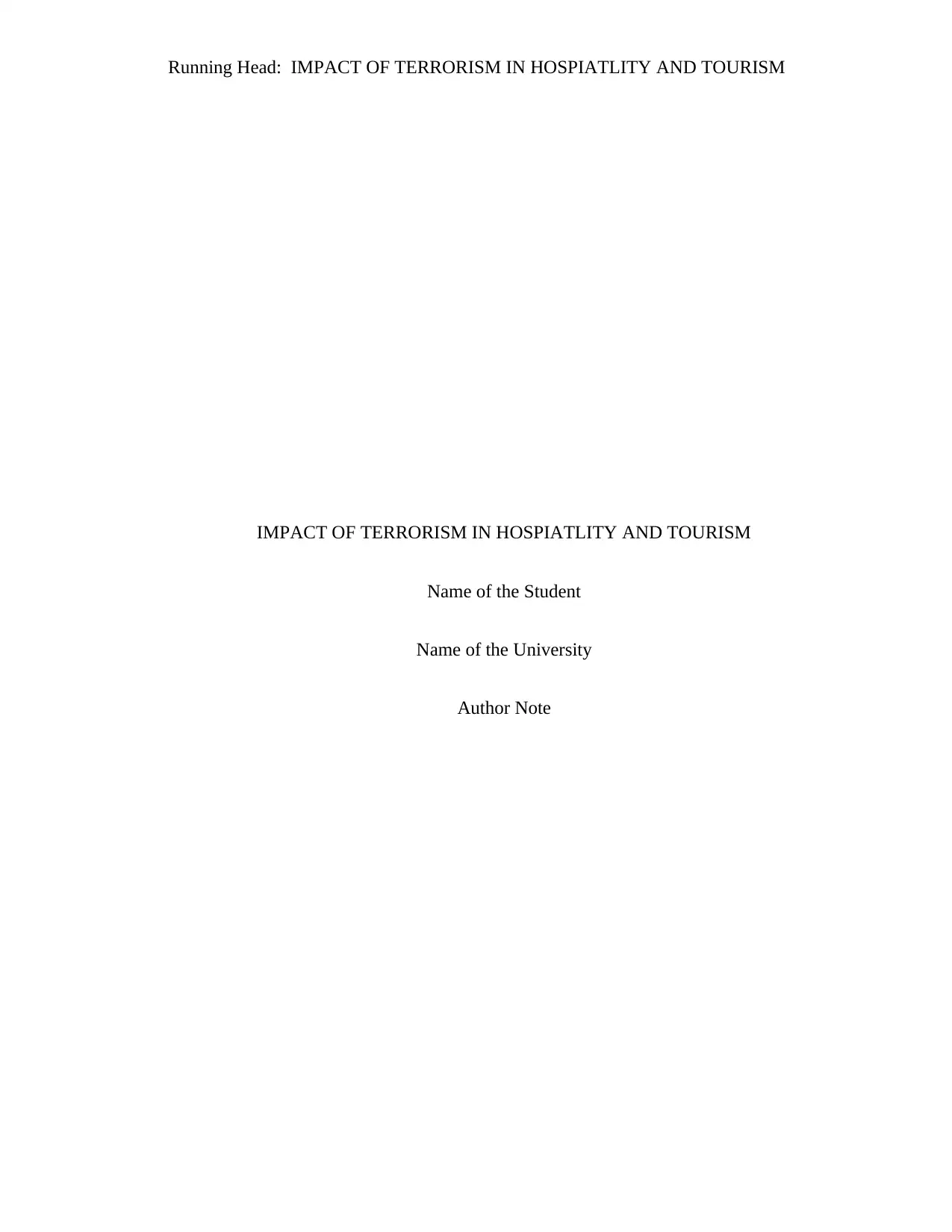
Running Head: IMPACT OF TERRORISM IN HOSPIATLITY AND TOURISM
IMPACT OF TERRORISM IN HOSPIATLITY AND TOURISM
Name of the Student
Name of the University
Author Note
IMPACT OF TERRORISM IN HOSPIATLITY AND TOURISM
Name of the Student
Name of the University
Author Note
Secure Best Marks with AI Grader
Need help grading? Try our AI Grader for instant feedback on your assignments.
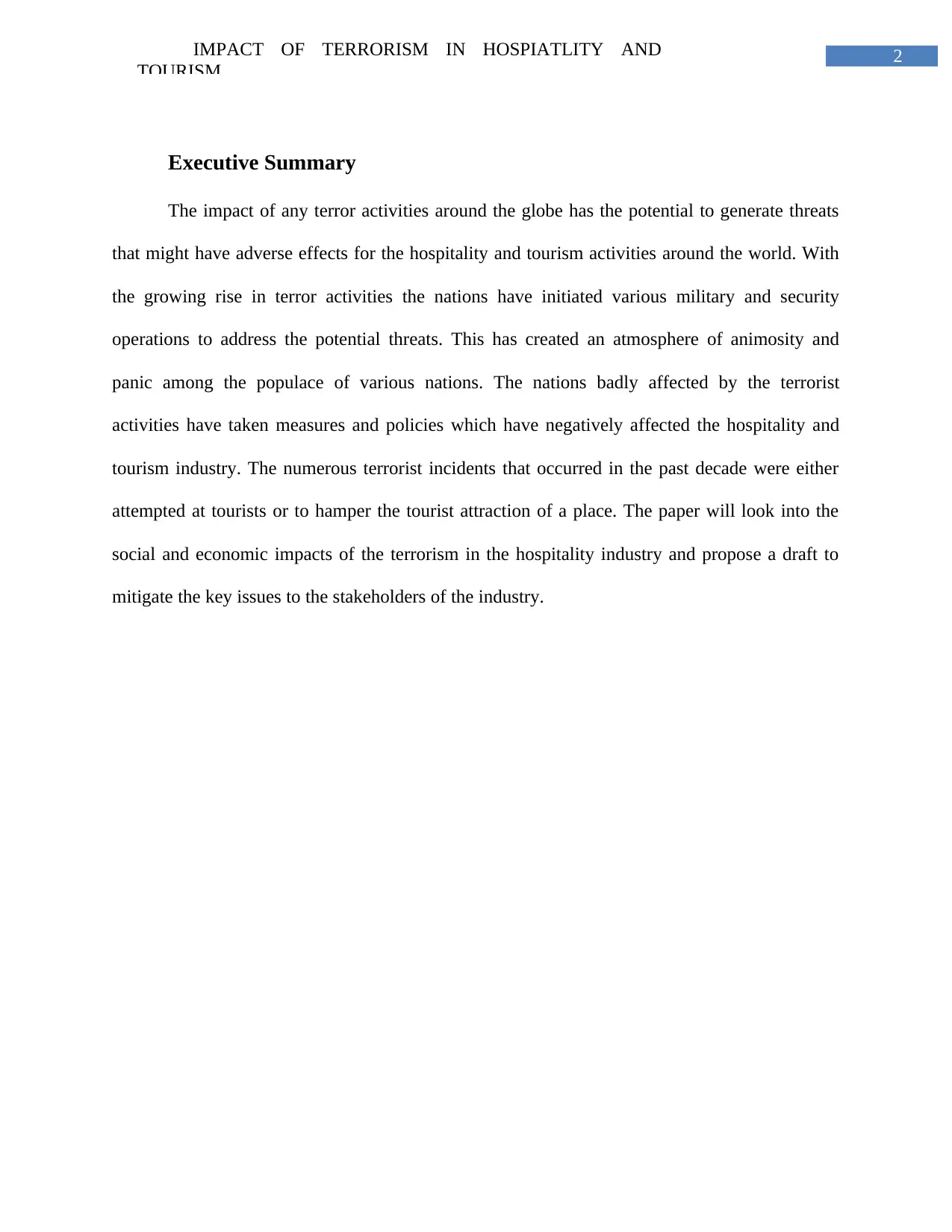
2IMPACT OF TERRORISM IN HOSPIATLITY AND
TOURISM
Executive Summary
The impact of any terror activities around the globe has the potential to generate threats
that might have adverse effects for the hospitality and tourism activities around the world. With
the growing rise in terror activities the nations have initiated various military and security
operations to address the potential threats. This has created an atmosphere of animosity and
panic among the populace of various nations. The nations badly affected by the terrorist
activities have taken measures and policies which have negatively affected the hospitality and
tourism industry. The numerous terrorist incidents that occurred in the past decade were either
attempted at tourists or to hamper the tourist attraction of a place. The paper will look into the
social and economic impacts of the terrorism in the hospitality industry and propose a draft to
mitigate the key issues to the stakeholders of the industry.
TOURISM
Executive Summary
The impact of any terror activities around the globe has the potential to generate threats
that might have adverse effects for the hospitality and tourism activities around the world. With
the growing rise in terror activities the nations have initiated various military and security
operations to address the potential threats. This has created an atmosphere of animosity and
panic among the populace of various nations. The nations badly affected by the terrorist
activities have taken measures and policies which have negatively affected the hospitality and
tourism industry. The numerous terrorist incidents that occurred in the past decade were either
attempted at tourists or to hamper the tourist attraction of a place. The paper will look into the
social and economic impacts of the terrorism in the hospitality industry and propose a draft to
mitigate the key issues to the stakeholders of the industry.
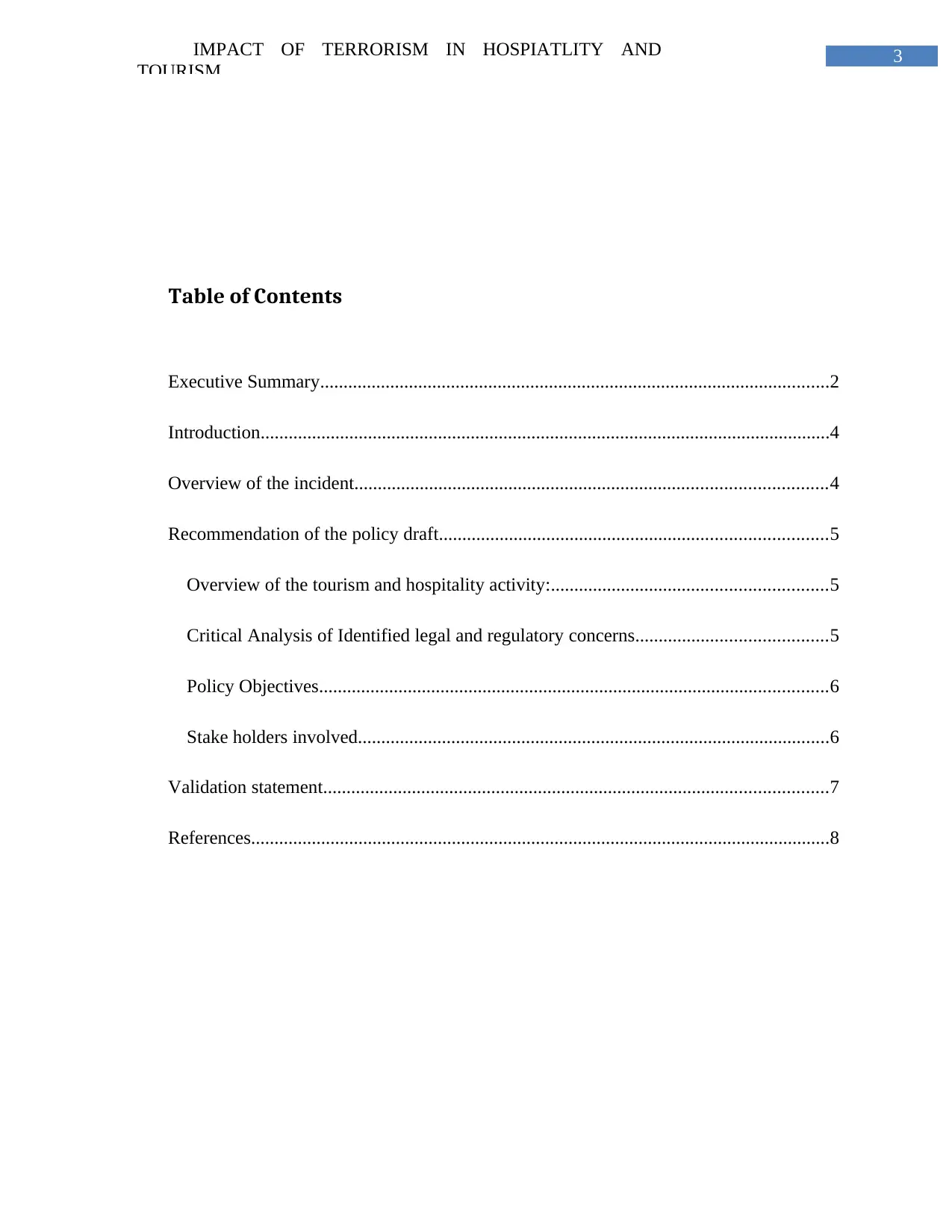
3IMPACT OF TERRORISM IN HOSPIATLITY AND
TOURISM
Table of Contents
Executive Summary.............................................................................................................2
Introduction..........................................................................................................................4
Overview of the incident.....................................................................................................4
Recommendation of the policy draft...................................................................................5
Overview of the tourism and hospitality activity:...........................................................5
Critical Analysis of Identified legal and regulatory concerns.........................................5
Policy Objectives.............................................................................................................6
Stake holders involved.....................................................................................................6
Validation statement............................................................................................................7
References............................................................................................................................8
TOURISM
Table of Contents
Executive Summary.............................................................................................................2
Introduction..........................................................................................................................4
Overview of the incident.....................................................................................................4
Recommendation of the policy draft...................................................................................5
Overview of the tourism and hospitality activity:...........................................................5
Critical Analysis of Identified legal and regulatory concerns.........................................5
Policy Objectives.............................................................................................................6
Stake holders involved.....................................................................................................6
Validation statement............................................................................................................7
References............................................................................................................................8
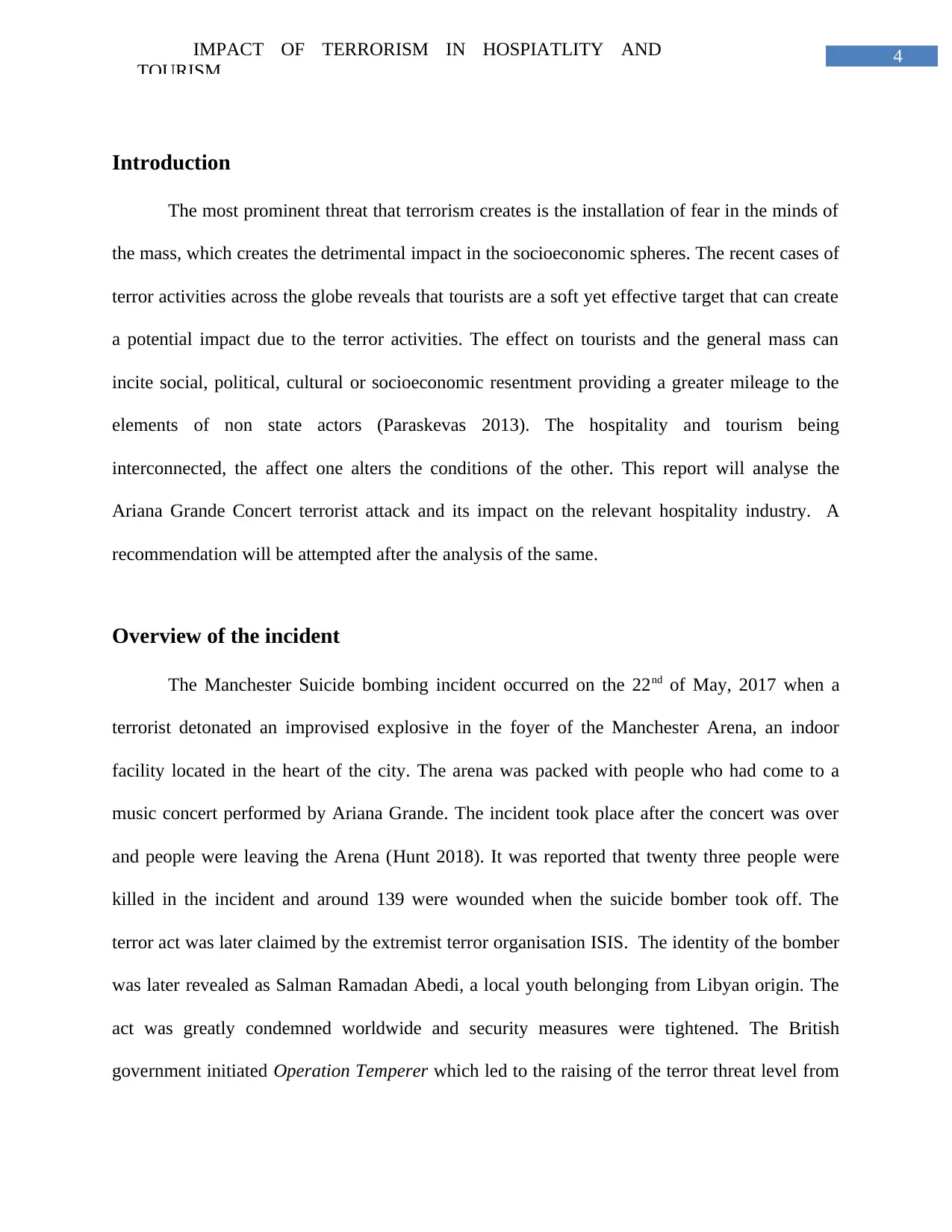
4IMPACT OF TERRORISM IN HOSPIATLITY AND
TOURISM
Introduction
The most prominent threat that terrorism creates is the installation of fear in the minds of
the mass, which creates the detrimental impact in the socioeconomic spheres. The recent cases of
terror activities across the globe reveals that tourists are a soft yet effective target that can create
a potential impact due to the terror activities. The effect on tourists and the general mass can
incite social, political, cultural or socioeconomic resentment providing a greater mileage to the
elements of non state actors (Paraskevas 2013). The hospitality and tourism being
interconnected, the affect one alters the conditions of the other. This report will analyse the
Ariana Grande Concert terrorist attack and its impact on the relevant hospitality industry. A
recommendation will be attempted after the analysis of the same.
Overview of the incident
The Manchester Suicide bombing incident occurred on the 22nd of May, 2017 when a
terrorist detonated an improvised explosive in the foyer of the Manchester Arena, an indoor
facility located in the heart of the city. The arena was packed with people who had come to a
music concert performed by Ariana Grande. The incident took place after the concert was over
and people were leaving the Arena (Hunt 2018). It was reported that twenty three people were
killed in the incident and around 139 were wounded when the suicide bomber took off. The
terror act was later claimed by the extremist terror organisation ISIS. The identity of the bomber
was later revealed as Salman Ramadan Abedi, a local youth belonging from Libyan origin. The
act was greatly condemned worldwide and security measures were tightened. The British
government initiated Operation Temperer which led to the raising of the terror threat level from
TOURISM
Introduction
The most prominent threat that terrorism creates is the installation of fear in the minds of
the mass, which creates the detrimental impact in the socioeconomic spheres. The recent cases of
terror activities across the globe reveals that tourists are a soft yet effective target that can create
a potential impact due to the terror activities. The effect on tourists and the general mass can
incite social, political, cultural or socioeconomic resentment providing a greater mileage to the
elements of non state actors (Paraskevas 2013). The hospitality and tourism being
interconnected, the affect one alters the conditions of the other. This report will analyse the
Ariana Grande Concert terrorist attack and its impact on the relevant hospitality industry. A
recommendation will be attempted after the analysis of the same.
Overview of the incident
The Manchester Suicide bombing incident occurred on the 22nd of May, 2017 when a
terrorist detonated an improvised explosive in the foyer of the Manchester Arena, an indoor
facility located in the heart of the city. The arena was packed with people who had come to a
music concert performed by Ariana Grande. The incident took place after the concert was over
and people were leaving the Arena (Hunt 2018). It was reported that twenty three people were
killed in the incident and around 139 were wounded when the suicide bomber took off. The
terror act was later claimed by the extremist terror organisation ISIS. The identity of the bomber
was later revealed as Salman Ramadan Abedi, a local youth belonging from Libyan origin. The
act was greatly condemned worldwide and security measures were tightened. The British
government initiated Operation Temperer which led to the raising of the terror threat level from
Secure Best Marks with AI Grader
Need help grading? Try our AI Grader for instant feedback on your assignments.
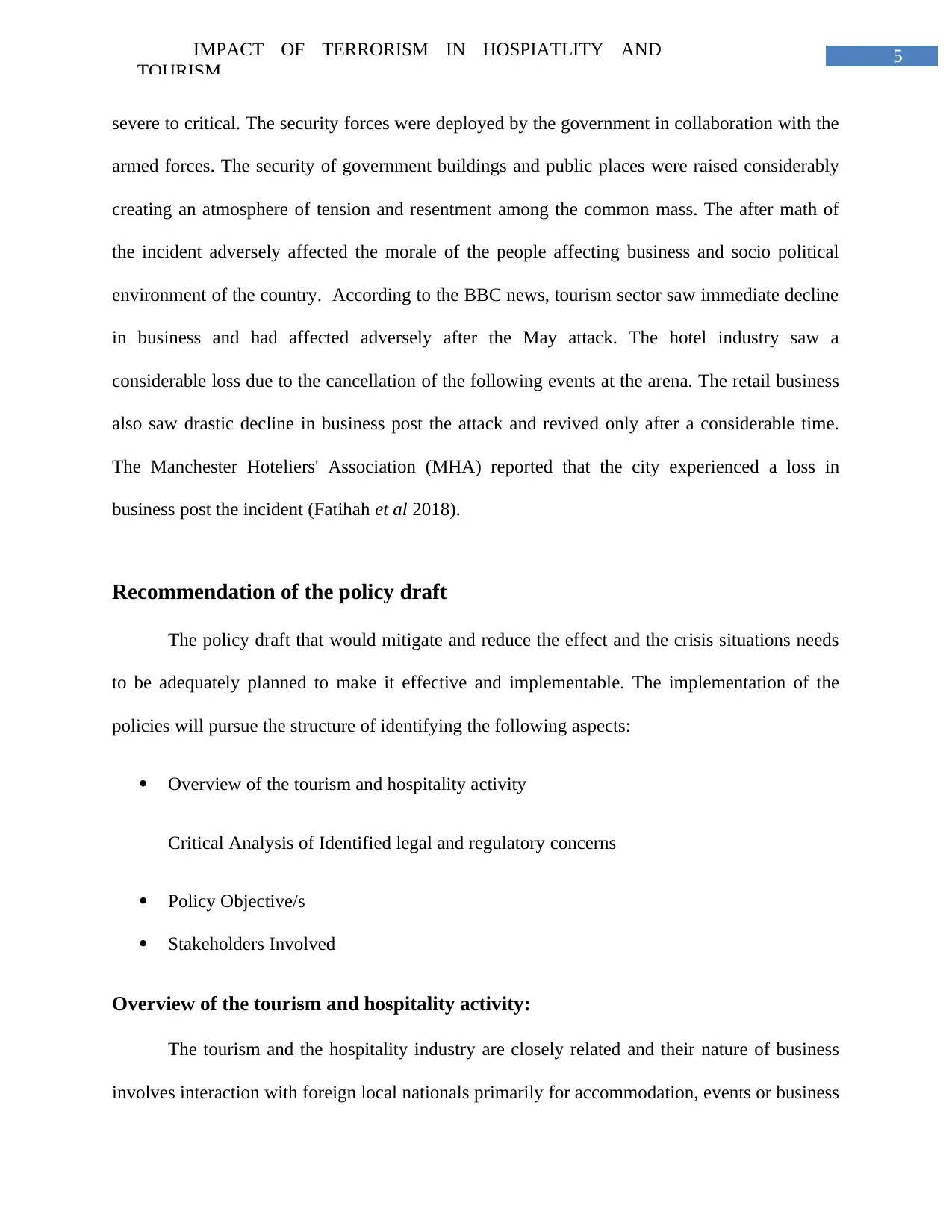
5IMPACT OF TERRORISM IN HOSPIATLITY AND
TOURISM
severe to critical. The security forces were deployed by the government in collaboration with the
armed forces. The security of government buildings and public places were raised considerably
creating an atmosphere of tension and resentment among the common mass. The after math of
the incident adversely affected the morale of the people affecting business and socio political
environment of the country. According to the BBC news, tourism sector saw immediate decline
in business and had affected adversely after the May attack. The hotel industry saw a
considerable loss due to the cancellation of the following events at the arena. The retail business
also saw drastic decline in business post the attack and revived only after a considerable time.
The Manchester Hoteliers' Association (MHA) reported that the city experienced a loss in
business post the incident (Fatihah et al 2018).
Recommendation of the policy draft
The policy draft that would mitigate and reduce the effect and the crisis situations needs
to be adequately planned to make it effective and implementable. The implementation of the
policies will pursue the structure of identifying the following aspects:
Overview of the tourism and hospitality activity
Critical Analysis of Identified legal and regulatory concerns
Policy Objective/s
Stakeholders Involved
Overview of the tourism and hospitality activity:
The tourism and the hospitality industry are closely related and their nature of business
involves interaction with foreign local nationals primarily for accommodation, events or business
TOURISM
severe to critical. The security forces were deployed by the government in collaboration with the
armed forces. The security of government buildings and public places were raised considerably
creating an atmosphere of tension and resentment among the common mass. The after math of
the incident adversely affected the morale of the people affecting business and socio political
environment of the country. According to the BBC news, tourism sector saw immediate decline
in business and had affected adversely after the May attack. The hotel industry saw a
considerable loss due to the cancellation of the following events at the arena. The retail business
also saw drastic decline in business post the attack and revived only after a considerable time.
The Manchester Hoteliers' Association (MHA) reported that the city experienced a loss in
business post the incident (Fatihah et al 2018).
Recommendation of the policy draft
The policy draft that would mitigate and reduce the effect and the crisis situations needs
to be adequately planned to make it effective and implementable. The implementation of the
policies will pursue the structure of identifying the following aspects:
Overview of the tourism and hospitality activity
Critical Analysis of Identified legal and regulatory concerns
Policy Objective/s
Stakeholders Involved
Overview of the tourism and hospitality activity:
The tourism and the hospitality industry are closely related and their nature of business
involves interaction with foreign local nationals primarily for accommodation, events or business
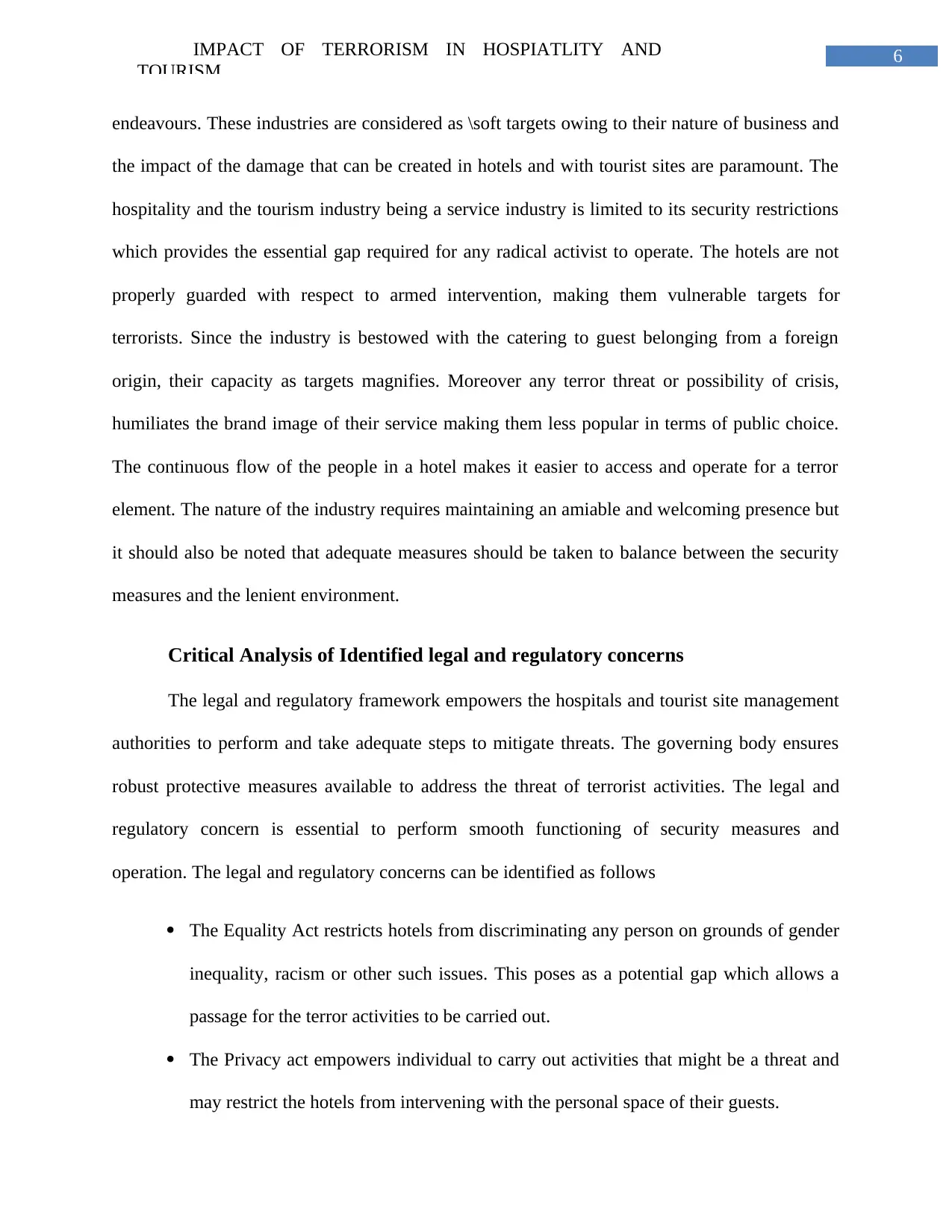
6IMPACT OF TERRORISM IN HOSPIATLITY AND
TOURISM
endeavours. These industries are considered as \soft targets owing to their nature of business and
the impact of the damage that can be created in hotels and with tourist sites are paramount. The
hospitality and the tourism industry being a service industry is limited to its security restrictions
which provides the essential gap required for any radical activist to operate. The hotels are not
properly guarded with respect to armed intervention, making them vulnerable targets for
terrorists. Since the industry is bestowed with the catering to guest belonging from a foreign
origin, their capacity as targets magnifies. Moreover any terror threat or possibility of crisis,
humiliates the brand image of their service making them less popular in terms of public choice.
The continuous flow of the people in a hotel makes it easier to access and operate for a terror
element. The nature of the industry requires maintaining an amiable and welcoming presence but
it should also be noted that adequate measures should be taken to balance between the security
measures and the lenient environment.
Critical Analysis of Identified legal and regulatory concerns
The legal and regulatory framework empowers the hospitals and tourist site management
authorities to perform and take adequate steps to mitigate threats. The governing body ensures
robust protective measures available to address the threat of terrorist activities. The legal and
regulatory concern is essential to perform smooth functioning of security measures and
operation. The legal and regulatory concerns can be identified as follows
The Equality Act restricts hotels from discriminating any person on grounds of gender
inequality, racism or other such issues. This poses as a potential gap which allows a
passage for the terror activities to be carried out.
The Privacy act empowers individual to carry out activities that might be a threat and
may restrict the hotels from intervening with the personal space of their guests.
TOURISM
endeavours. These industries are considered as \soft targets owing to their nature of business and
the impact of the damage that can be created in hotels and with tourist sites are paramount. The
hospitality and the tourism industry being a service industry is limited to its security restrictions
which provides the essential gap required for any radical activist to operate. The hotels are not
properly guarded with respect to armed intervention, making them vulnerable targets for
terrorists. Since the industry is bestowed with the catering to guest belonging from a foreign
origin, their capacity as targets magnifies. Moreover any terror threat or possibility of crisis,
humiliates the brand image of their service making them less popular in terms of public choice.
The continuous flow of the people in a hotel makes it easier to access and operate for a terror
element. The nature of the industry requires maintaining an amiable and welcoming presence but
it should also be noted that adequate measures should be taken to balance between the security
measures and the lenient environment.
Critical Analysis of Identified legal and regulatory concerns
The legal and regulatory framework empowers the hospitals and tourist site management
authorities to perform and take adequate steps to mitigate threats. The governing body ensures
robust protective measures available to address the threat of terrorist activities. The legal and
regulatory concern is essential to perform smooth functioning of security measures and
operation. The legal and regulatory concerns can be identified as follows
The Equality Act restricts hotels from discriminating any person on grounds of gender
inequality, racism or other such issues. This poses as a potential gap which allows a
passage for the terror activities to be carried out.
The Privacy act empowers individual to carry out activities that might be a threat and
may restrict the hotels from intervening with the personal space of their guests.
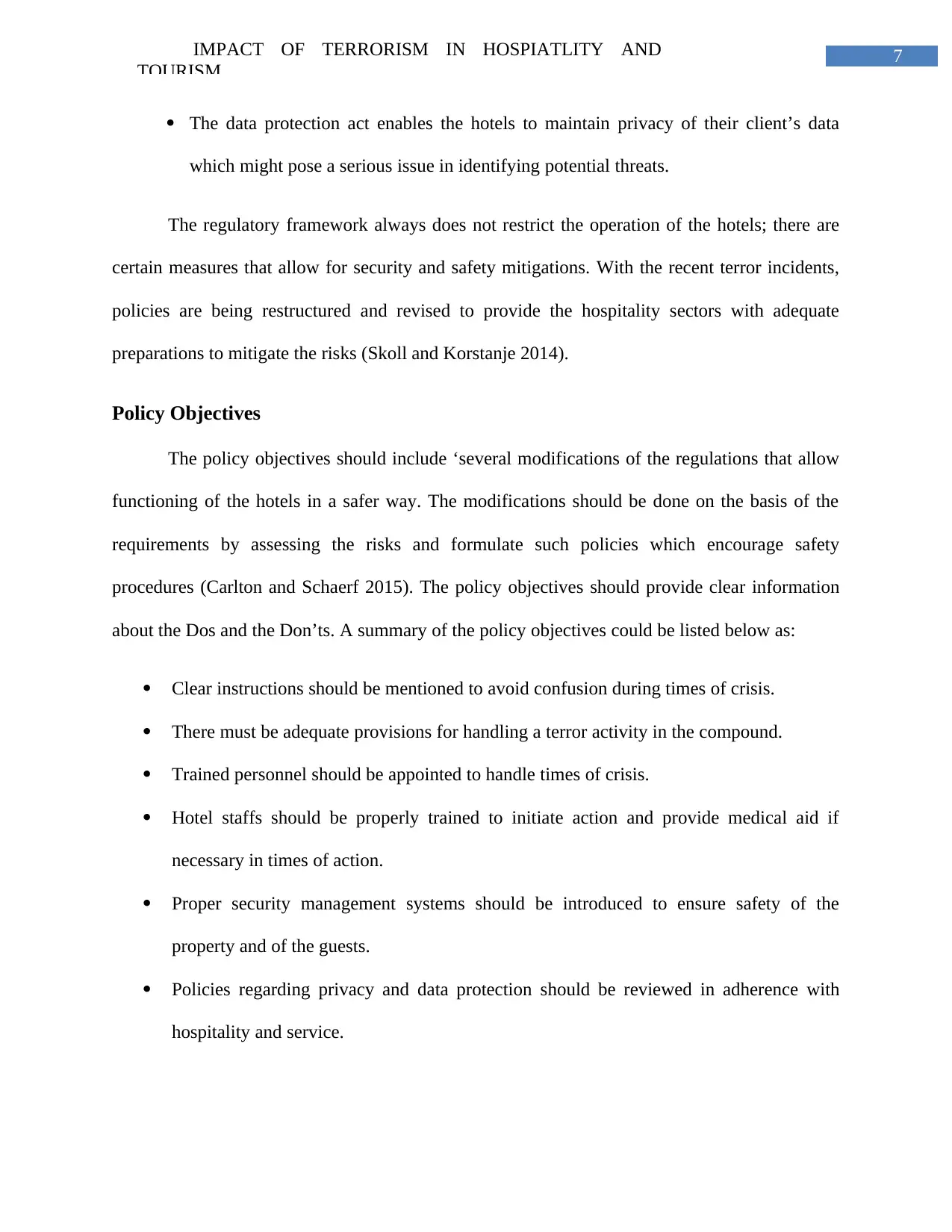
7IMPACT OF TERRORISM IN HOSPIATLITY AND
TOURISM
The data protection act enables the hotels to maintain privacy of their client’s data
which might pose a serious issue in identifying potential threats.
The regulatory framework always does not restrict the operation of the hotels; there are
certain measures that allow for security and safety mitigations. With the recent terror incidents,
policies are being restructured and revised to provide the hospitality sectors with adequate
preparations to mitigate the risks (Skoll and Korstanje 2014).
Policy Objectives
The policy objectives should include ‘several modifications of the regulations that allow
functioning of the hotels in a safer way. The modifications should be done on the basis of the
requirements by assessing the risks and formulate such policies which encourage safety
procedures (Carlton and Schaerf 2015). The policy objectives should provide clear information
about the Dos and the Don’ts. A summary of the policy objectives could be listed below as:
Clear instructions should be mentioned to avoid confusion during times of crisis.
There must be adequate provisions for handling a terror activity in the compound.
Trained personnel should be appointed to handle times of crisis.
Hotel staffs should be properly trained to initiate action and provide medical aid if
necessary in times of action.
Proper security management systems should be introduced to ensure safety of the
property and of the guests.
Policies regarding privacy and data protection should be reviewed in adherence with
hospitality and service.
TOURISM
The data protection act enables the hotels to maintain privacy of their client’s data
which might pose a serious issue in identifying potential threats.
The regulatory framework always does not restrict the operation of the hotels; there are
certain measures that allow for security and safety mitigations. With the recent terror incidents,
policies are being restructured and revised to provide the hospitality sectors with adequate
preparations to mitigate the risks (Skoll and Korstanje 2014).
Policy Objectives
The policy objectives should include ‘several modifications of the regulations that allow
functioning of the hotels in a safer way. The modifications should be done on the basis of the
requirements by assessing the risks and formulate such policies which encourage safety
procedures (Carlton and Schaerf 2015). The policy objectives should provide clear information
about the Dos and the Don’ts. A summary of the policy objectives could be listed below as:
Clear instructions should be mentioned to avoid confusion during times of crisis.
There must be adequate provisions for handling a terror activity in the compound.
Trained personnel should be appointed to handle times of crisis.
Hotel staffs should be properly trained to initiate action and provide medical aid if
necessary in times of action.
Proper security management systems should be introduced to ensure safety of the
property and of the guests.
Policies regarding privacy and data protection should be reviewed in adherence with
hospitality and service.
Paraphrase This Document
Need a fresh take? Get an instant paraphrase of this document with our AI Paraphraser
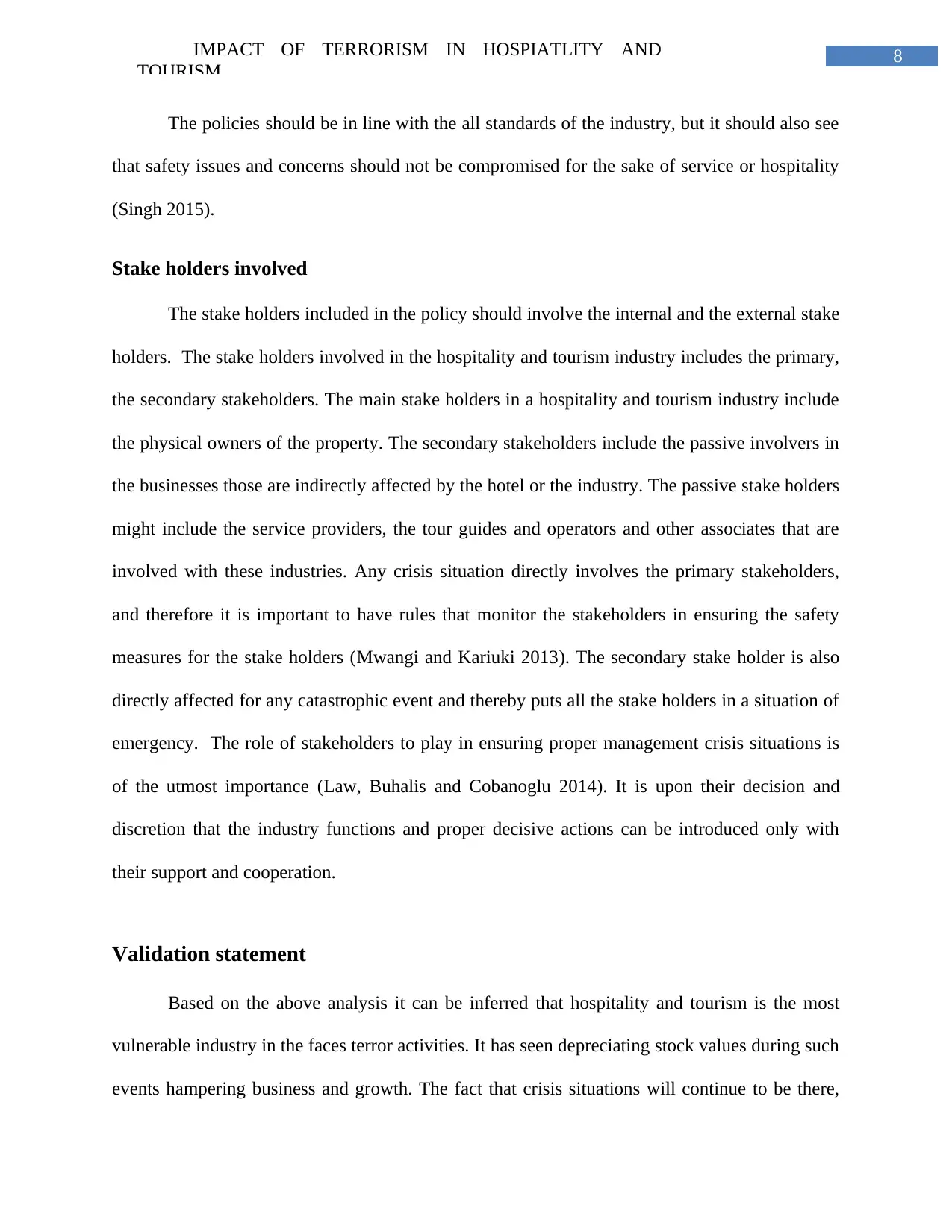
8IMPACT OF TERRORISM IN HOSPIATLITY AND
TOURISM
The policies should be in line with the all standards of the industry, but it should also see
that safety issues and concerns should not be compromised for the sake of service or hospitality
(Singh 2015).
Stake holders involved
The stake holders included in the policy should involve the internal and the external stake
holders. The stake holders involved in the hospitality and tourism industry includes the primary,
the secondary stakeholders. The main stake holders in a hospitality and tourism industry include
the physical owners of the property. The secondary stakeholders include the passive involvers in
the businesses those are indirectly affected by the hotel or the industry. The passive stake holders
might include the service providers, the tour guides and operators and other associates that are
involved with these industries. Any crisis situation directly involves the primary stakeholders,
and therefore it is important to have rules that monitor the stakeholders in ensuring the safety
measures for the stake holders (Mwangi and Kariuki 2013). The secondary stake holder is also
directly affected for any catastrophic event and thereby puts all the stake holders in a situation of
emergency. The role of stakeholders to play in ensuring proper management crisis situations is
of the utmost importance (Law, Buhalis and Cobanoglu 2014). It is upon their decision and
discretion that the industry functions and proper decisive actions can be introduced only with
their support and cooperation.
Validation statement
Based on the above analysis it can be inferred that hospitality and tourism is the most
vulnerable industry in the faces terror activities. It has seen depreciating stock values during such
events hampering business and growth. The fact that crisis situations will continue to be there,
TOURISM
The policies should be in line with the all standards of the industry, but it should also see
that safety issues and concerns should not be compromised for the sake of service or hospitality
(Singh 2015).
Stake holders involved
The stake holders included in the policy should involve the internal and the external stake
holders. The stake holders involved in the hospitality and tourism industry includes the primary,
the secondary stakeholders. The main stake holders in a hospitality and tourism industry include
the physical owners of the property. The secondary stakeholders include the passive involvers in
the businesses those are indirectly affected by the hotel or the industry. The passive stake holders
might include the service providers, the tour guides and operators and other associates that are
involved with these industries. Any crisis situation directly involves the primary stakeholders,
and therefore it is important to have rules that monitor the stakeholders in ensuring the safety
measures for the stake holders (Mwangi and Kariuki 2013). The secondary stake holder is also
directly affected for any catastrophic event and thereby puts all the stake holders in a situation of
emergency. The role of stakeholders to play in ensuring proper management crisis situations is
of the utmost importance (Law, Buhalis and Cobanoglu 2014). It is upon their decision and
discretion that the industry functions and proper decisive actions can be introduced only with
their support and cooperation.
Validation statement
Based on the above analysis it can be inferred that hospitality and tourism is the most
vulnerable industry in the faces terror activities. It has seen depreciating stock values during such
events hampering business and growth. The fact that crisis situations will continue to be there,
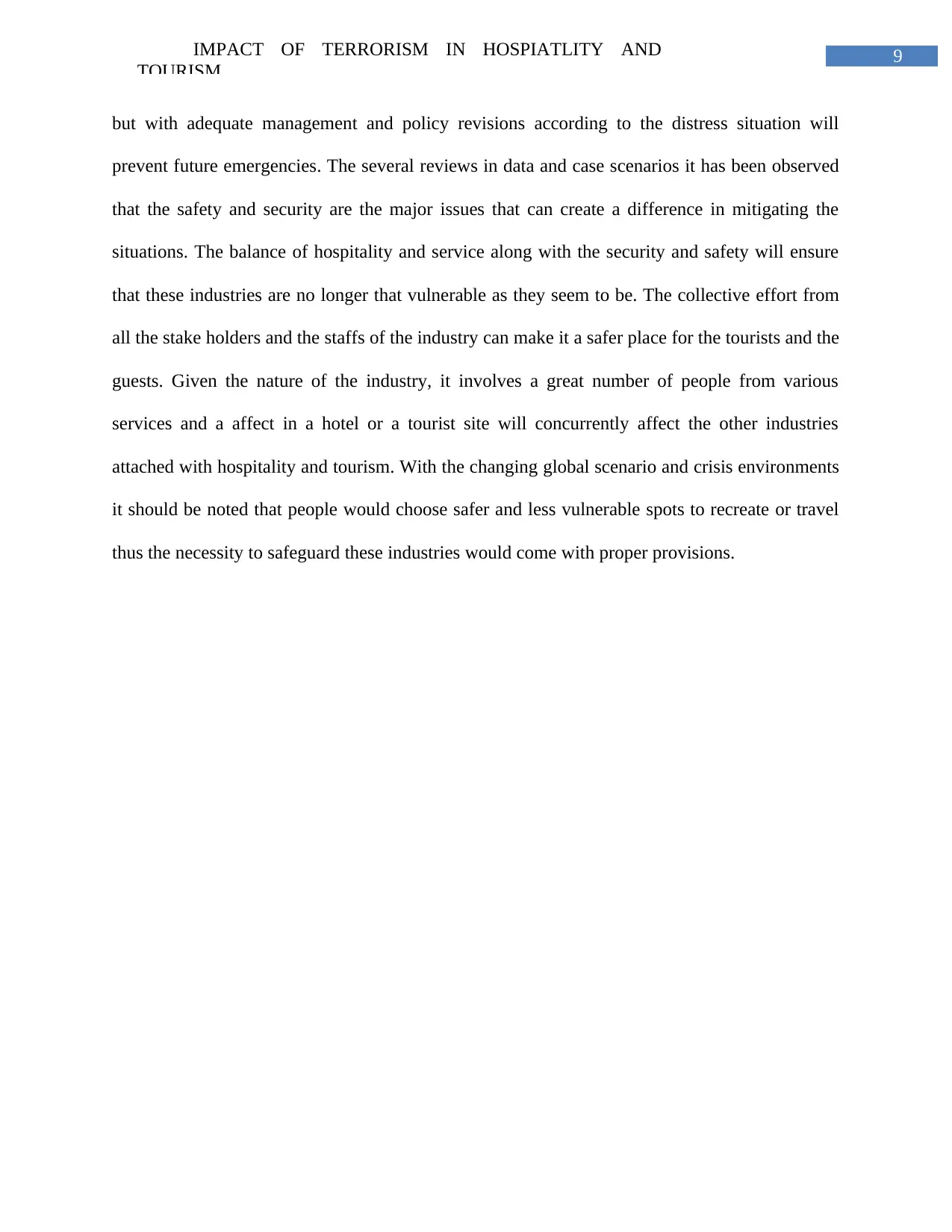
9IMPACT OF TERRORISM IN HOSPIATLITY AND
TOURISM
but with adequate management and policy revisions according to the distress situation will
prevent future emergencies. The several reviews in data and case scenarios it has been observed
that the safety and security are the major issues that can create a difference in mitigating the
situations. The balance of hospitality and service along with the security and safety will ensure
that these industries are no longer that vulnerable as they seem to be. The collective effort from
all the stake holders and the staffs of the industry can make it a safer place for the tourists and the
guests. Given the nature of the industry, it involves a great number of people from various
services and a affect in a hotel or a tourist site will concurrently affect the other industries
attached with hospitality and tourism. With the changing global scenario and crisis environments
it should be noted that people would choose safer and less vulnerable spots to recreate or travel
thus the necessity to safeguard these industries would come with proper provisions.
TOURISM
but with adequate management and policy revisions according to the distress situation will
prevent future emergencies. The several reviews in data and case scenarios it has been observed
that the safety and security are the major issues that can create a difference in mitigating the
situations. The balance of hospitality and service along with the security and safety will ensure
that these industries are no longer that vulnerable as they seem to be. The collective effort from
all the stake holders and the staffs of the industry can make it a safer place for the tourists and the
guests. Given the nature of the industry, it involves a great number of people from various
services and a affect in a hotel or a tourist site will concurrently affect the other industries
attached with hospitality and tourism. With the changing global scenario and crisis environments
it should be noted that people would choose safer and less vulnerable spots to recreate or travel
thus the necessity to safeguard these industries would come with proper provisions.
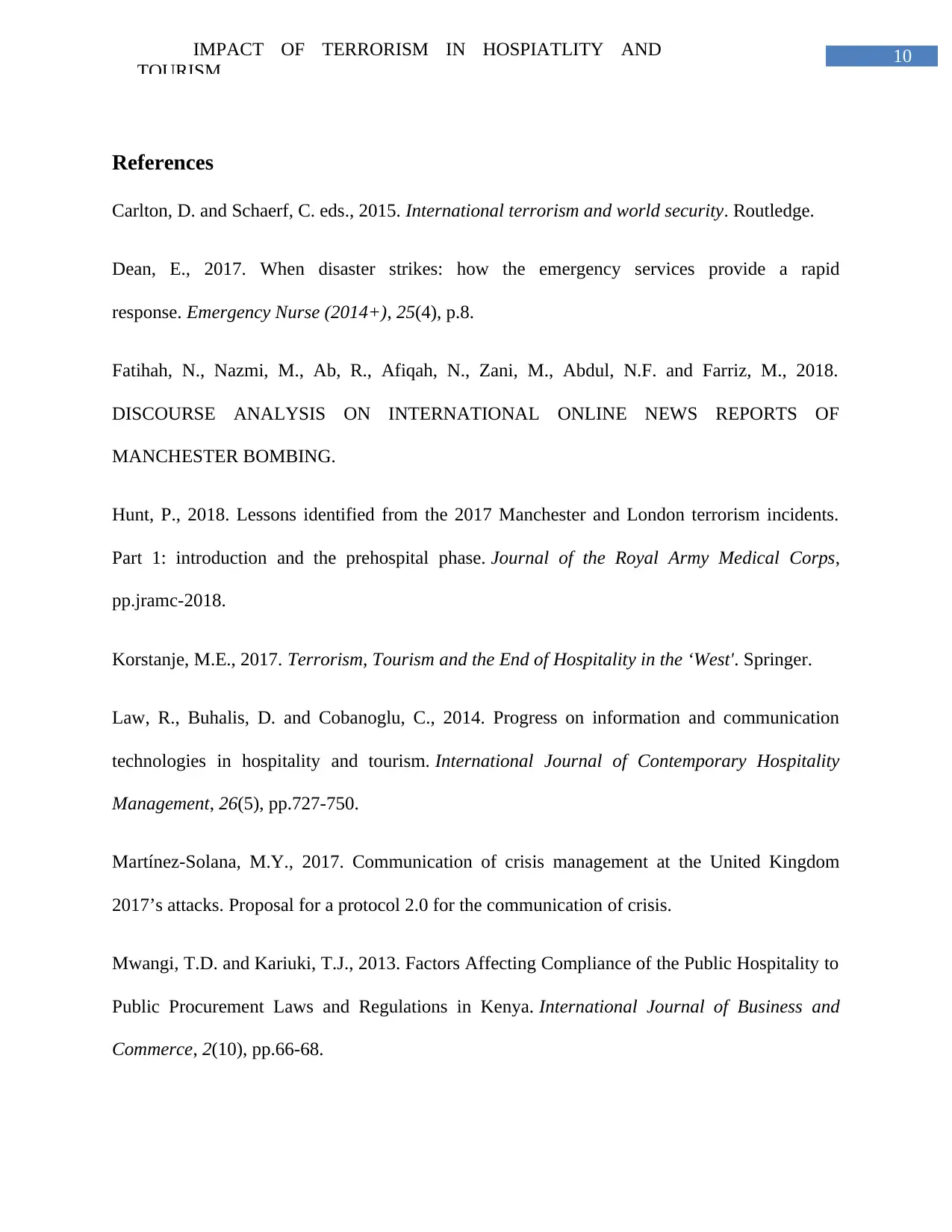
10IMPACT OF TERRORISM IN HOSPIATLITY AND
TOURISM
References
Carlton, D. and Schaerf, C. eds., 2015. International terrorism and world security. Routledge.
Dean, E., 2017. When disaster strikes: how the emergency services provide a rapid
response. Emergency Nurse (2014+), 25(4), p.8.
Fatihah, N., Nazmi, M., Ab, R., Afiqah, N., Zani, M., Abdul, N.F. and Farriz, M., 2018.
DISCOURSE ANALYSIS ON INTERNATIONAL ONLINE NEWS REPORTS OF
MANCHESTER BOMBING.
Hunt, P., 2018. Lessons identified from the 2017 Manchester and London terrorism incidents.
Part 1: introduction and the prehospital phase. Journal of the Royal Army Medical Corps,
pp.jramc-2018.
Korstanje, M.E., 2017. Terrorism, Tourism and the End of Hospitality in the ‘West'. Springer.
Law, R., Buhalis, D. and Cobanoglu, C., 2014. Progress on information and communication
technologies in hospitality and tourism. International Journal of Contemporary Hospitality
Management, 26(5), pp.727-750.
Martínez-Solana, M.Y., 2017. Communication of crisis management at the United Kingdom
2017’s attacks. Proposal for a protocol 2.0 for the communication of crisis.
Mwangi, T.D. and Kariuki, T.J., 2013. Factors Affecting Compliance of the Public Hospitality to
Public Procurement Laws and Regulations in Kenya. International Journal of Business and
Commerce, 2(10), pp.66-68.
TOURISM
References
Carlton, D. and Schaerf, C. eds., 2015. International terrorism and world security. Routledge.
Dean, E., 2017. When disaster strikes: how the emergency services provide a rapid
response. Emergency Nurse (2014+), 25(4), p.8.
Fatihah, N., Nazmi, M., Ab, R., Afiqah, N., Zani, M., Abdul, N.F. and Farriz, M., 2018.
DISCOURSE ANALYSIS ON INTERNATIONAL ONLINE NEWS REPORTS OF
MANCHESTER BOMBING.
Hunt, P., 2018. Lessons identified from the 2017 Manchester and London terrorism incidents.
Part 1: introduction and the prehospital phase. Journal of the Royal Army Medical Corps,
pp.jramc-2018.
Korstanje, M.E., 2017. Terrorism, Tourism and the End of Hospitality in the ‘West'. Springer.
Law, R., Buhalis, D. and Cobanoglu, C., 2014. Progress on information and communication
technologies in hospitality and tourism. International Journal of Contemporary Hospitality
Management, 26(5), pp.727-750.
Martínez-Solana, M.Y., 2017. Communication of crisis management at the United Kingdom
2017’s attacks. Proposal for a protocol 2.0 for the communication of crisis.
Mwangi, T.D. and Kariuki, T.J., 2013. Factors Affecting Compliance of the Public Hospitality to
Public Procurement Laws and Regulations in Kenya. International Journal of Business and
Commerce, 2(10), pp.66-68.
Secure Best Marks with AI Grader
Need help grading? Try our AI Grader for instant feedback on your assignments.
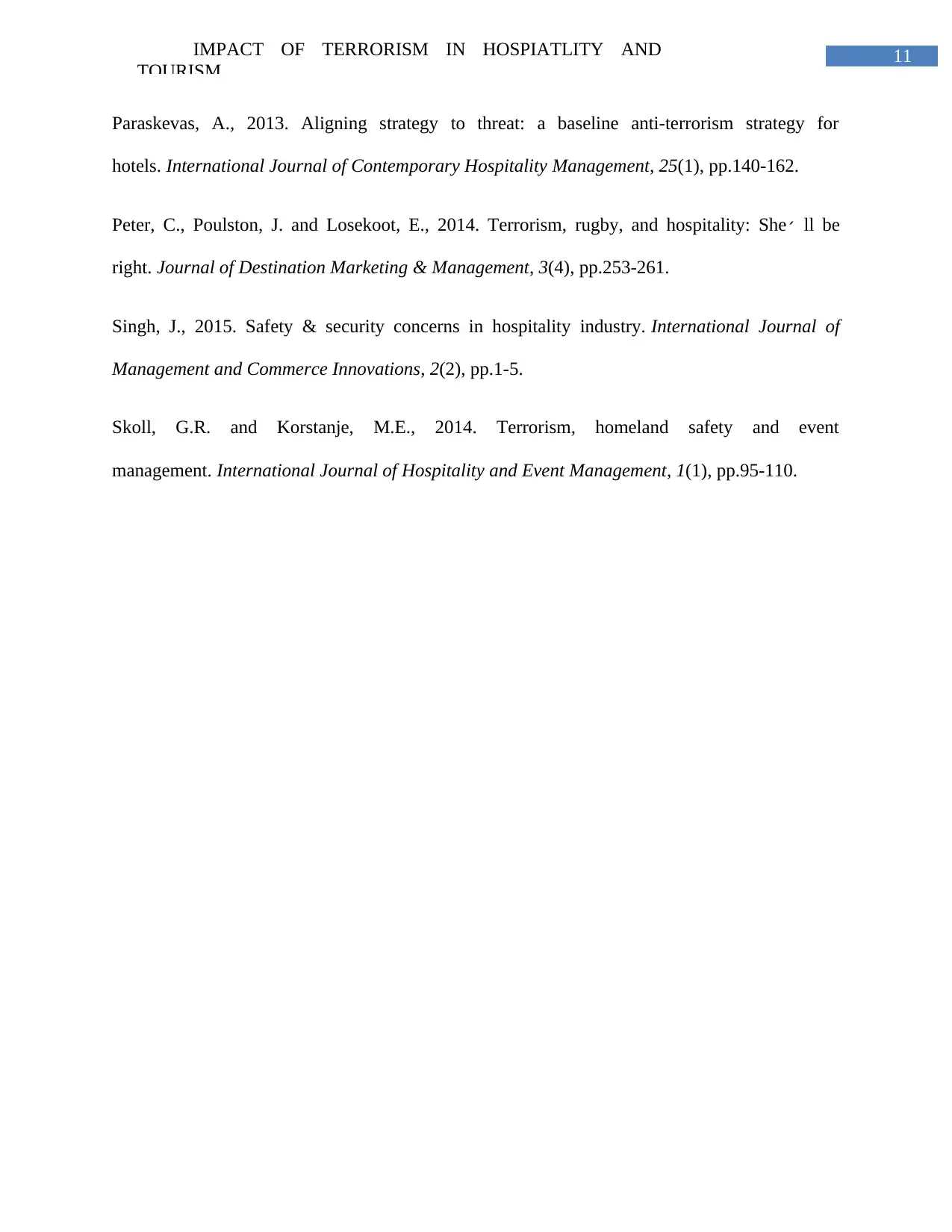
11IMPACT OF TERRORISM IN HOSPIATLITY AND
TOURISM
Paraskevas, A., 2013. Aligning strategy to threat: a baseline anti-terrorism strategy for
hotels. International Journal of Contemporary Hospitality Management, 25(1), pp.140-162.
Peter, C., Poulston, J. and Losekoot, E., 2014. Terrorism, rugby, and hospitality: She׳ ll be
right. Journal of Destination Marketing & Management, 3(4), pp.253-261.
Singh, J., 2015. Safety & security concerns in hospitality industry. International Journal of
Management and Commerce Innovations, 2(2), pp.1-5.
Skoll, G.R. and Korstanje, M.E., 2014. Terrorism, homeland safety and event
management. International Journal of Hospitality and Event Management, 1(1), pp.95-110.
TOURISM
Paraskevas, A., 2013. Aligning strategy to threat: a baseline anti-terrorism strategy for
hotels. International Journal of Contemporary Hospitality Management, 25(1), pp.140-162.
Peter, C., Poulston, J. and Losekoot, E., 2014. Terrorism, rugby, and hospitality: She׳ ll be
right. Journal of Destination Marketing & Management, 3(4), pp.253-261.
Singh, J., 2015. Safety & security concerns in hospitality industry. International Journal of
Management and Commerce Innovations, 2(2), pp.1-5.
Skoll, G.R. and Korstanje, M.E., 2014. Terrorism, homeland safety and event
management. International Journal of Hospitality and Event Management, 1(1), pp.95-110.
1 out of 11
Your All-in-One AI-Powered Toolkit for Academic Success.
+13062052269
info@desklib.com
Available 24*7 on WhatsApp / Email
![[object Object]](/_next/static/media/star-bottom.7253800d.svg)
Unlock your academic potential
© 2024 | Zucol Services PVT LTD | All rights reserved.

